

Life is one of those things which, if you take a mechanistic view, really ought never have happened. I mean yes, we’ve found organic molecules in space and on outer planets, but really. Fred Hoyle called it correctly when he suggested that expecting organic life as we know it to have arrived by accident is about as sensible as expecting a hurricane to blow through a junkyard and spontaneously assemble a complete, working Boeing 737. He and Chandra Wickramasinghe devised a theory to explain life by saying that it arrived from outer space in comets. They might be right. The really bizarre thing about life on earth is that it is very old. The universe itself is about 13.8 billion years old. The earth is about a third of that age. Fossil remains tell us that life of one sort or another has been around on earth from the earliest days.
And this makes no sense at all. Four billion years ago the earth was being constantly bombarded by meteorite impacts devastating enough to wipe out all life on the surface. And yet it persisted. How? Well, that really is a puzzler. One suggestion is that life continued far below the surface. For all the chatter about the Goldilocks Zone, we have found evidence of life at superheated temperatures. But this is only the start of the eternal miracle. Organic life as we know it – as distinct from the micro-organisms we’ve found in the deep oceans – needed a bizarre series of coincidences. Here’s a short list of what we had:
- A rotating magnetic core to keep up the Van Allen Trousers. Otherwise gamma rays would destroy everything, and solar winds would blow our atmosphere away.
- A huge moon to give us mammoth tides which allowed life to flourish in tidal pools.
- Mind-bogglingly improbable algae to break up CO2 into free oxygen: a job continued by trees, plants and seaweed to this day. Number of exo-planets and moons we’ve found so far with free oxygen = zero. Oxygen’s electronegativity is 3.5: second only to fluorine at 4. Yet 21% of our atmosphere is oxygen, thanks to our little green friends.
- A friendly neighbourhood gas giant to harvest most of the interstellar debris coming our way. No wonder we called Jupiter king of the gods. Thanks!
- A tilted orbit so we can have seasons.
- A rotational period just long enough so we don’t bake to death by day, or freeze by night; yet not so fast that hurricanes destroy everything in their path. (Too often.)
- Massive quantities of water.
- And of course the whole Goldilocks Zone thing, which also includes a planet big enough not to let the water evaporate away.
- Amazing metals from beyond the stars. (Fun fact: our sun cannot make any element beyond iron. No copper, silver, gold, nickel etc)
- The Triassic Greening. After the Palaeozic Era the earth was a baking hellscape. Then it rained for two million years. Why? No-one knows. I guess we got lucky again.
Professor Brian Cox is on record as suggesting that we really are alone in our galaxy. I’m prepared to believe him. Secular scientists have adapted the theory of parallel universes to suggest that of all the untold billions of possible universes, we live in the one where human life happens to be possible. We are the product of unimaginable improbabilities. All this begs the question, though. What exactly is life anyway? The best answer is that life is what counteracts entropy. If it’s self-organizing, and self-reproducing, and finds a way to beat the inexorable gradient of ever-increasing disorder, then it’s alive. But what’s the meaning of it all? What’s the purpose of life?
Right. That question. Religion is hard-wired into humanity. We’re not in a position to cross-examine animals and plants, but I will lay you odds that they’re spiritual beings too. According to The Dawkins Delusion, we’re supposed to be leaving all that stuff behind now we’re all inheritors of the magnificent edifice of science. On Dawkins, Terry Eagleton said it best:

Most professional sceptics eventually go mad. The only ones I know of who didn’t are from New Zealand Sceptics. They do things differently in the Crescent Isles. But that’s not really the point.
The late, lamented Sir Terry Pratchett was the greatest writer of the late 20th century. He had his little kinks about kings and the like, but his warm-hearted good humour has been a salve which has eased the hearts of millions. In his book Hogfather he made a crucial point about the amount of belief in the universe being finite and immutable. Abolish belief in the Hogfather and all sorts of weird demiurges spontaneously spring into existence, like the Eater of Socks, the Verucca Gnome and the Oh God of Hangovers. Stop believing in one thing and you immediately start to believe in something else. What is the biggest form of occult belief now? Pseudo-nutrition. The weird belief in mysterious toxins could only have arisen in a sudden metaphysical pocket of vacuum. The myth of the impartial sceptic who accepts nothing at face value is a risible confection. Everyone believes in something. It may be completely irrational; but what of that? What we ask you of your beliefs is this. Are they kind? Are they useful? Are they amusing? Do they give comfort? Do they make you what we have reason to believe might be a better person?
Far too many folks wear themselves out trying to smash other people’s belief systems. It’s usually pointless, stupid, and cruel. In Stanisław Lem’s Star Diaries a quasi-supreme being mentions a thoroughly pious tribe who believe that salvation lies in obbling, and emulating the blessed Dimblegensians. Now, quoth he, am I to annihilate all belief in Dimblegensians? Am I to tell them that obbling is futile? This, the creature concludes, would be tantamount to psychic murder. Lem, by the by, may well be the most intelligent man who ever lived. His philosophy was at bottom Dostoievskian and gloomy; but being Polish, he couldn’t stop himself from being possibly also the funniest man who ever lived. Had he only written The Cyberiad his reputation would already be immortal. If you don’t know it (in Michael Kandel’s brilliant translation), you have a treat in store.
When we survey the weird beliefs of so many atheists, we realize that we cannot enter their heads at all. Yes, it’s tragicomic when we see idiots trying to rebuild Noah’s Ark. But there are millions of people out there who worship cars. I don’t get it. It’s a bloody car. It’s got four wheels, a motor, brakes, and a steering wheel. It drives you places. Why the hell should anyone worship it? And yes, look: I’m sorry. We are going to take your petrol-worship away, for good and sufficient reasons. But you can have an electric car, and you can erect tabernacles around it in your garage if you want. I won’t stop you. I will only issue protests when your religion actively harms others. And other folks believe in Nature, with a capital N. Oh, but I want natural remedies! Last time we looked, your natural remedies were made out of the same organic compounds as synthetic drugs. All sorts of things are natural. Like smallpox. It doesn’t mean they’re good. Do yourselves a favour and stay well clear of Nature-worship. It turns your brain to mush.
What I am building up to here is a short history of the Anglican Church, in which I was once an altar boy at St Luke’s, North Brighton. Like so many others, the parish is defunct. No, we’re not perfect. But then: we never pretended to be. We have our Obadaiah Slopes the same as anyone else. But our Church was founded at a time when Christian Europe was tearing itself apart in monstrous acts of mass cruelty and destruction. 16thC Anglicans were effectively telling the rest of Europe look: you’re all bloody mad, you know that? You are stark, raving bonkers, all of you.

Thus Michel de Montaigne (one of the Good French Philosophers). Although that’s rather unfair. I don’t know any animals who would stoop to having someone boiled in oil for saying people should worship any way they want to. Yet Pope Paul IV did just that. John Calvin had his best friend slowly roasted to death because he wrote about the Eternal Son of God instead of the Son of the Eternal God. (Or maybe the other way around. I don’t know which, and I don’t care.) But Montaigne was speaking in French, where bête and sauvage have darker meanings than in English. He was a brilliant scholar; but he also possessed a unique quality of sanity.
Before we embark on Western Christianity, I would like to take you briefly through ancient China. I am not qualified to talk about India. Sitting through nine hours of Mahabharata, as I have, doesn’t make you any less of a neophyte. I am by no means confident I understood it; and I’m not sure I liked it. (The one thing which really did ring true was that the oldest stories are always about two villages: one called Us and the other called Them.) Let others expound, if they will. During the time of the Warring Kingdoms the Chinese were slaughtering each other in numbers undreamt-of. Confucius (or Gong Fuzi to the locals) was a man who realized that politeness was a good idea and should be compulsory. He laid down rules for every conceivable social interaction. Everyone has their place in the hierarchy; everyone knows their place; positions of authority are decided on merit alone; and even the poorest lad in China can sit the exams and finish up as an Imperial Councillor if he’s bright and works hard. All Is Well Under Heaven in consequence. If the Master’s mat was not straight, it was said, then the Master would not sit.
Yes, it was a bit feudal, and male supremacist. Of course it was. As bureaucratic systems go, it was a damn fine one, and lasted far longer than most. So long as the top remains honest, then corruption is suppressed, and order maintained. There was a silver gong outside the Metropolitan Court of Justice. Any citizen of the Empire could strike that gong, and their complaint must be investigated. If you’d like to know more, the best introduction for Westerners is Robert van Gulik’s Judge Dee novels. RVG was a Belgian diplomat who was a fluent Mandarin speaker and scholar. And he it was who introduced the West to Di Renjeh, the Tang Dynasty’s answer to Sherlock Holmes. If the Imperial court was corrupt, then it all went downhill very fast. And we got Interesting Times. There were one hundred and eight immortals reborn into every generation of Interesting Times who would make matters right. There’s a novel about that: Outlaws of the Marsh. It was Mao Zedong’s favourite book, and explains why he did everything right in making his way to imperial power. The complete pigs’ breakfast he made of things once he attained power is satisfactorily explained by the fact that the novel ends with our hero Lin Chung dictating terms to the Emperor. The sequel – What To Do Once You’re In – never seems to have got written.
Another sage rebelled against the stifling formality of Confucianism. Laozi is one of my favourite writers ever. His sole book Dao De Jing is only five thousand characters long. It made a deep impression on me as a boy, and if your heart is anything like pure it will do the same for you. Please: read it.
The tale of how it came to be written is a great story in itself:
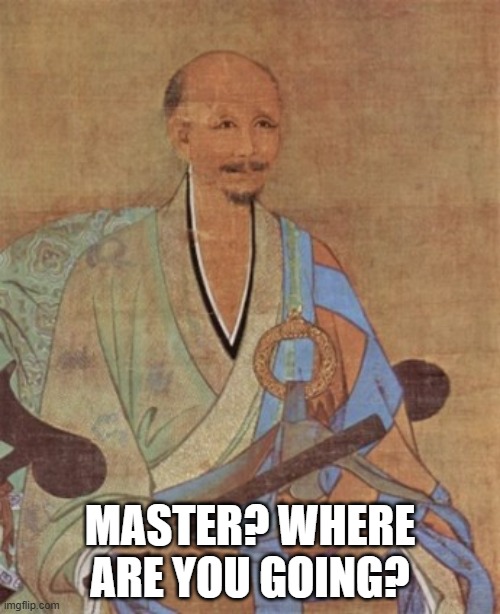
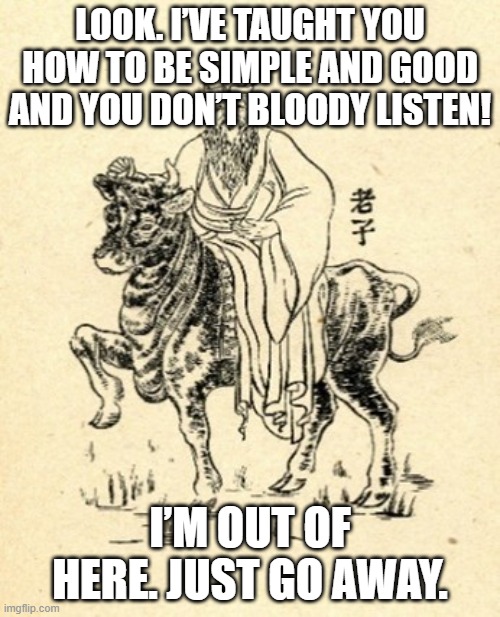
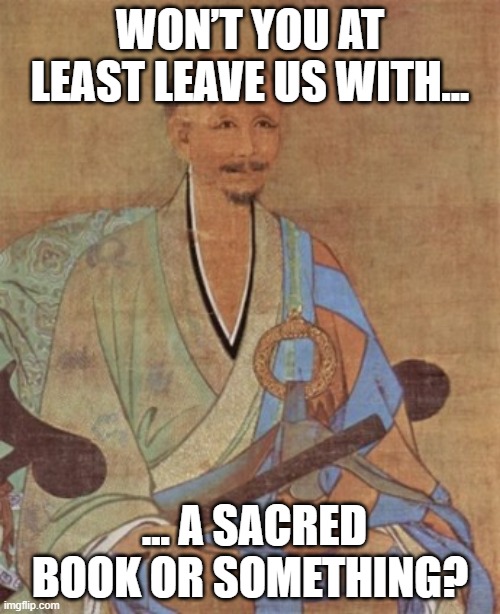
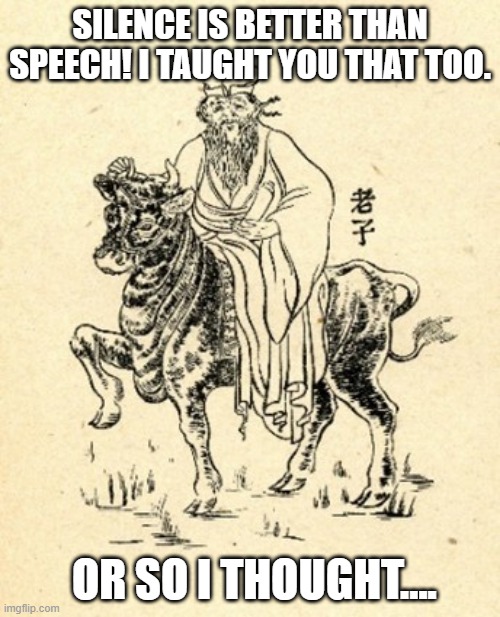
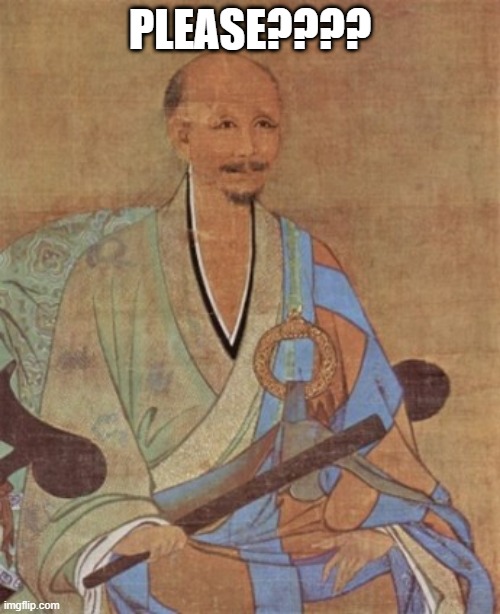
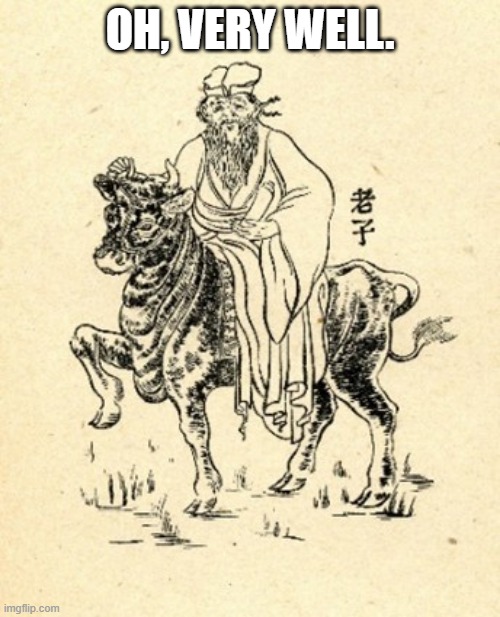


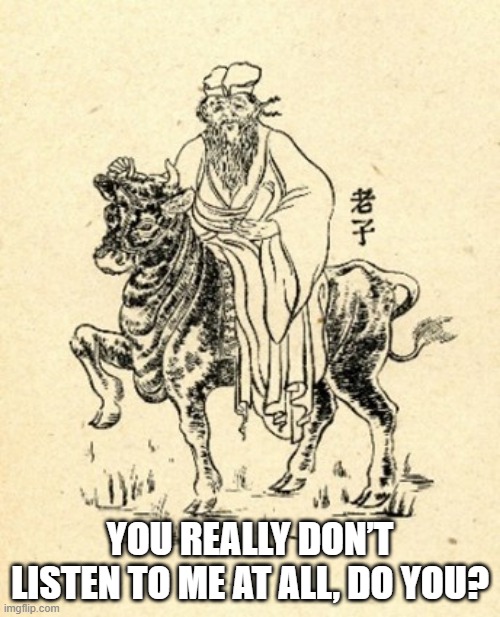
And there was Gautama, who taught that life was suffering, and the only solace we have is to get off the endless wheel and attain Nirvana. Buddhism was an Indian importation to China, and became the third religion of the Middle Kingdom. I’m not sure I get Buddhism either, although … while the creed itself sounds profoundly depressing, many of its adherents seem terribly happy and blissful.
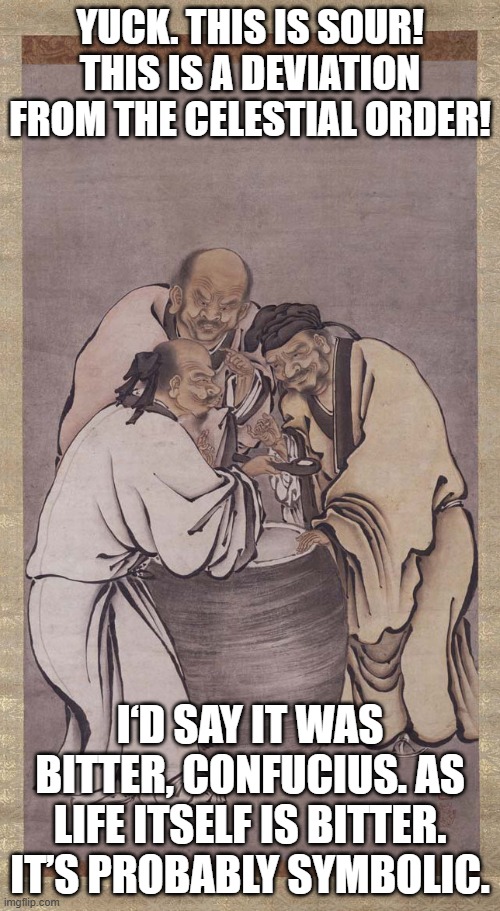
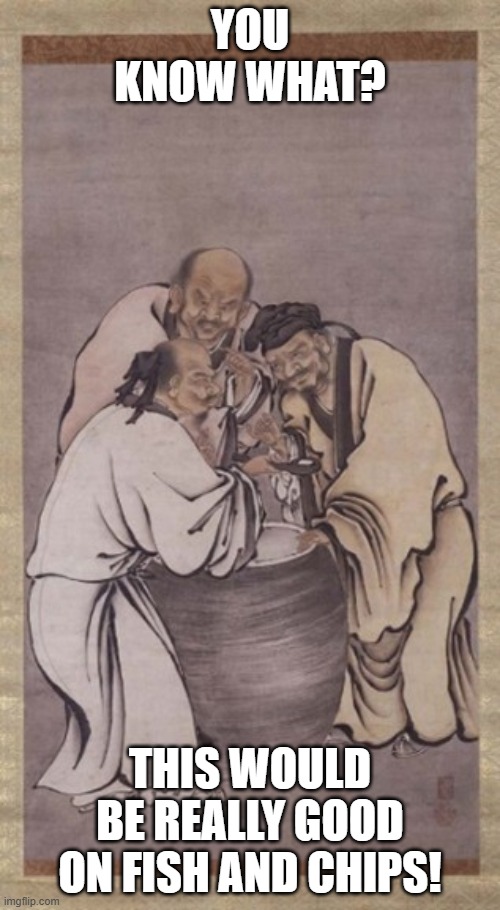
The Three Vinegar Tasters is an old tale, written up by Daoists, as you can imagine. They have generally had the best of the PR wars between the sects. Daoism is definitely my preferred option of the three, but the others have their place. I brought it up to emphasise the point that many cultures have different solutions to the Life, The Universe and Everything problem. One thing all cultures have in common is religious faith of some kind. There are those who want to tell you that religion is a prison from which we must free ourselves. Most of these people don’t actually know anything about it. We do owe them sympathy. It must be a terrible thing to feel that life is meaningless. If it really were meaningless, it would never have happened in the first place. All things strive, as Tak wrote. (Tak being Pratchett’s dwarfish prophet.)
Let’s talk about Christianity. And the first thing we need to say is that the Old Testament was written down in Hebrew during the Babylonian Captivity, by scholars trying to make sense of Where It All Went Wrong for us. It was not dictated by the Lord God of Hosts, in person, in 20thC American. It is not a literal account of Things That Happened. If it were, there would not be two entirely different accounts of the Creation. (Genesis 1 to 2:1: the Creation in Six Days) and the evidently older tale of the Garden of Eden. (Genesis 2:2 onwards.) Baby Jesus did not play with dinosaurs. The universe is not six thousand years old. It is 13.8 billion years old at the very least. There may have been other universes before this one. It is folktale. Go build yourselves arks if you must, but prepare to be laughed at. By the by, Noah’s Ark was originally Babylonian. And round.


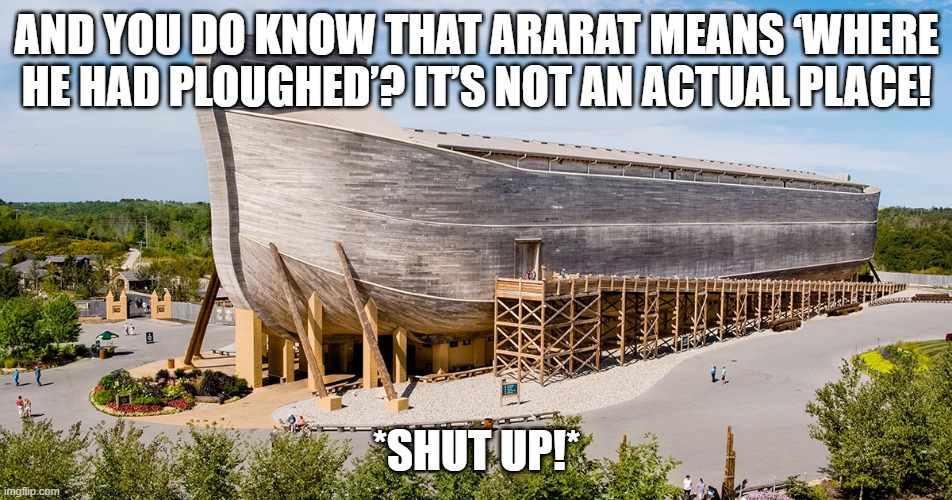
The unpleasant decrees of Moses must be seen for what they are: an attempt to build rules of survival in an ancient desert culture with no refrigeration. There’s no need to listen to them now if you’re a Christian. St Paul’s Epistle to the Romans makes that quite clear. By the time of Jesus, modernity – of a kind – had come to the Jews. They could no longer stomach Mosaic punishments and did their best to refine and interpret them into obscurity. Much of Jesus’ doctrines are those of Rabbi Hillel, although with some striking differences. The original Parable of the Vineyard has the labourers working pro rata. In Jesus’ version, those summoned late get the same pay as those who laboured all day. Moral: you cannot bargain with God. Accept His Grace for what it is and be thankful for it.
Was He the Son of God? To those who protest that such a thing is impossible, we say this. Very well. Have it your own way. But we say He was. Be aware of this, however. The Jews say there were two of Him: the zealot responsible for the more inflammatory passages in the Gospels; and the saintly preacher. And they say also this. Bar-Abbas means Son of the Father. When the mob cried unto Pilate Not This Man But Bar-Abbas! they were asking for the release of the saintly preacher. My own belief is that Jesus willingly exchanged Himself for the zealot and was martyred in the other’s place. The prophecy would be fulfilled. And … some of you clearly need to be told this, so here it is:
Saul of Tarsus was, let us admit it, a man of extraordinary gifts. To have annexed in its entirety a nascent religion and remade it in his own image was one of those things for which there was no possible foretelling. He was very much a Graeco-Roman Jew, and some of his neo-Platonic imaginings were exactly what we did not need. Jesus almost certainly spent some time in the desert among the Essenes. Their repellent misogyny seems to have passed Him by. His life as we know it was surrounded by women. Usually called Mary, or more correctly Miriam. To whom did the angel appear on Easter Sunday? Why: the Three Marys at the Sepulchre. Whom do you seek? He is gone from here.

For St Paul, all this had escaped his notice. At least he did manage not to mangle Jesus’ teachings too badly. More I shall not say. Save this. The idea that a loving Heavenly Father sends people to burn in torment for all eternity because they couldn’t follow a book of instructions is and remains a childish fairy-tale. We are not in kindergarten now. But Heaven and Hell are real all right. Heaven is that to which we aspire, when we are purged of our weaknesses. And Hell may be found anywhere there is brutality, wickedness, controlling behaviour, and generally treating people as things. If you want the sane version of Christianity, Tolkien’s works show us what it looks like. And it isn’t about bonking. Please. Get your minds out of the gutter. It’s about mercy, pity, charity; and above all redemption. Nothing is evil in its beginning. And nothing is irredeemable. Not if there is a soul in there. We can all be saved. You just have to want it.
I will pass lightly over the history of the Early Church. The endless bickerings, the Council of Nicaea, the squabbles about Arianism, the repellent behaviour of the Alexandrines, the misogyny of St Augustine of Hippo, the martyrdom of Hypatia and so on. But a respectful inclination of the head is owed to St Benedict. He found a world in ruins. What to do? Ora et Labora. A simple life of prayer and work. Growing things, speaking peace unto the heathen, and making oases of calm and fruitfulness in a world of desolation. Thus was Voltaire’s prescription (Il faut cultiver notre jardin) anticipated a millennium early.
Let’s talk about Britain instead. The story goes that St Joseph of Arimathea took Jesus to Glastonbury. His staff he planted on Wearyall Hill, and it grew into the wondrous Glastonbury Thorn. I have seen it for myself. It is a Syrian thorn, with an extra lobe on its leaves. It flowered at Christmas. It was vandalized frequently, most recently in 2010. Because there are always orcs in the world. It will rise again.


And Glastonbury Abbey was built. Naturally it was vandalized also, during the Reformation. Yet it remains the holiest of England’s sacred sites. Merely to walk there is a cure for sickness of heart. St Patrick trained as a monk there, before setting out to convert the Irish. Those who know no better like to claim that Christianity is responsible for most of the world’s ills. This is a fantasy. Humans are a cruel species by nature. We need a sense of awe and mystery to rise above our inner wickedness and torment. It is hugely risible that Glastonbury to this day appears also to be a haven for mystical mumbo-jumbo of the most extraordinary kind. People flock to the Tor to receive what they imagine are spiritual experiences. If they knew its blood-stained history they would not resort thither. But their delusions are best described as Mostly Harmless.
However things might be in the Byzantine Empire, wherein the Emperor Constantine conceived the innovative idea of nationalizing the Church, Christianity in the British Isles was a benign affair. It did nothing but good. All that was worth keeping in the pagan traditions it supplanted were woven into the fabric. Brigid the Goddess of Love became St Brigid. She was an actual person, by the way. She was the abbess of Cíll Dara (Oakchurch) and is the co-patron saint of Ireland. None of this was regarded as controversial. You’ve got these pagan festivals, have you? Samhain? A Night Of Hunted Things? That sounds all very right and proper. We’ll have All Saints’ on the following day, when celestial order is restored. But the spirits must have their night of freedom too. The bigotry which stained the history of our religion was a far later importation. Here’s a tale about St Mungo (or Kentigern), the patron saint of Glasgow. I have drawn on Joscelin’s Life of St Kentigern, but with a pre-Norman flavour. This is what Dark Age Christianity looked like:
By the 7thC the Saxons had discovered Christianity. What Everyone Thinks They Know about the conversion of England includes the factoid that it was St Augustine (the other one) who landed in Kent and began the process of conversion. It was already happening elsewhere. By 664 matters had come to a head. The Romans were, as ever, endlessly self-aggrandising. The idea that the gentle North did not want them interfering in their lives was not one they were prepared to countenance. The Synod of Whitby was presided over by St Hilda, the local abbess. A number of issues were thrashed out, including date-stamping of Easter eggs and the Celtic proto-mullet. St Hilda did not agree with the Roman takeover, but it happened anyway. This was a bad idea, but probably inevitable.



Insofar as the Romans could be persuaded to leave things alone, matters remained mostly unchanged. Alfred the Great – a hero without parallel in history – used the Church to organize his little kingdom and teach his ealdormen to read and write. Something not widely known about the early English Church is that they had not the slightest problem with charms and spells. There is a book of metrical charms against a number of ailments, including elfshot (Wið Færsticce). Hostility to folk remedies came much later. The early English loved the Bible and Saints’ Lives. 90% of their literature is just that. The Old Testament was their TV. Here’s a revealing fact for you. They did two poem versions of the Book of Genesis, which is where we get the story of the Fall of the Angels. (No, it isn’t in the Bible!) And here, during the expulsion from Eden, Adam does not blame Eve. Eve does not blame the serpent. They take responsibility for their own actions. Because that’s what adults do.
Alas, in the tenth century the Church began to get over-mighty. It was a pattern repeated far more egregiously abroad. It was English missionaries (Boniface of Crediton among others) who converted the Germans. But in 1079 the Pope (Gregory VII) made a momentous error of judgement. At Canossa he made the German Emperor kneel in the snow in his nightshirt over two winter nights, begging forgiveness for some imaginary sin. Henry died of pneumonia shortly afterwards. At this moment Germans learned that Europe was not their friend; and that the gentle, saintly English who had converted them were not in command of this vast enterprise. The optimistic spirituality of Hildegarde von Bingen gave place to the worldly self-aggrandisement of the insurgent Papacy.
Thirteen years earlier, another Pope had sanctioned the Norman Conquest. Anglo-Saxon England – the mirror of Christian civilization – was to be subjugated at the whim of the Bishop of Rome. And suddenly the Church, Pty Ltd became something much darker than it had ever been before. It took a long time for the rot to set in. The exuberant piety of the Middle Ages was in many respects wholly admirable. We still don’t really know how Europe’s cathedrals were built. They remain to this day an incomparable wonder of the world. And the music! Ecclesiastical music is arguably the pinnacle of western civilization. In Britain, Christianity mostly remained a benign flowering of simple faith. During the calamities of the 14th century, voices of dissent were heard. They were permitted. Piers Plowman – a work of hardy piety – remains in more copies than any other English book from those days. The anonymous author of Pearl and Sir Gawain and the Green Knight was probably the greatest of medieval poets.
After the Lancastrian usurpation England turned darker still. Heresy-hunters plied their grisly trade. Then we had the Tudor usurpation. Which might have continued in the same vein, except …. Henry VIII had a problem. He badly needed a son. And the beautiful and virtuous Catherine of Aragon was unable to give him one.
The Reformation
This was when, according to Sellar & Yeatman (1066 And All That) the Pope seceded with all his followers from the Church of England. What Henry’s fledgling dynasty needed at the time was a son. Or so he thought. You can hardly blame him for that. He had married his deceased brother’s Intended. European royalty at the time generally married distant relatives. Not only for dynastic reasons; but also so that a Papal annulment could be obtained if necessary. Henry was singularly unfortunate in his timing:
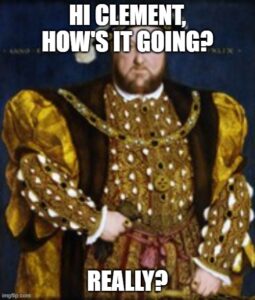

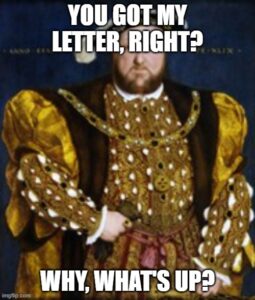


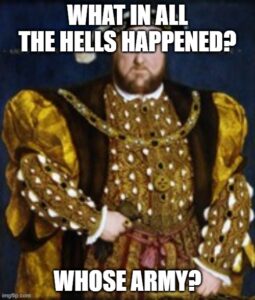


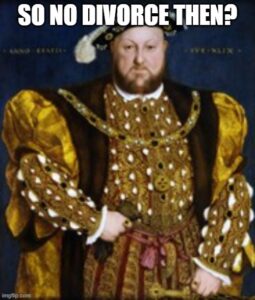
(And yes, I know that Henry was in so many ways a uniquely horrible person. Truth is that he was never the same after his tilting accident. Getting a spear in your helmet doesn’t do good things for mental health.)
And so the Church of England was born, out of perceived dynastic necessity. And what we got eventually was Elizabeth I, arguably our greatest monarch ever. Unlike her siblings, Elizabeth had no desire for religious intolerance. Yes, if you were a Catholic, life was grim. Given that the Pope was constantly sending missionary terrorists to assassinate Her; it’s hard to imagine what else she could have done. But loyal Catholics could expect Her protection. She gave a royal monopoly on the printing of sheet music to William Byrd and Thomas Tallis. Which gave not only a decent living to great composers; but was a warning to Protestant fanatics everywhere. These men are my friends. Touch them at your extreme peril.
Nobody, least of all her eccentric father, expected the long and glorious reign of Elizabeth I. No words of mine can adequately express a proper admiration for the Virgin Queen. She was the most brilliant diplomat of Her day, and outfoxed and bewildered all the crowned heads of Europe. Alas, you can’t mention her without tripping over Mary Queen of Scots. And while I like to present a sympathetic view of humanity in general, the senseless idolatry of this feather-brained Valley Girl must cease.
Holyrood:


The Earl of Bothwell:




Loch Leven:


Fotheringhay:



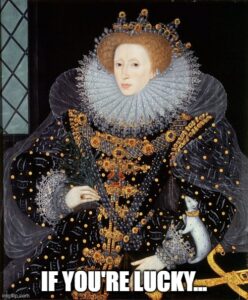
Enough of Mary Stuart. She was an idiot, and Elizabeth put up with her continual assassination plots for nearly twenty years before, with the utmost reluctance, cutting her head off. Elizabeth Tudor by contrast was a polymathic genius who spoke six languages fluently. When she told her subjects that it was an impertinence for them to hold opinions on matters of state, they readily assented. She trusted in very few: Burghley, Walsingham and one or two others. In her own self, she provided the fledgling Church of England with a sane replacement for Mary the Mother of God. Which her subjects missed sorely. Mariolatry is a dangerous cult at worst; but the devout need a balance of male and female in their devotions. Their dauntless captain steered Her fragile kingdom through unimaginable perils. And they loved Her. Justly.
At bottom, the Church of England grew into an improbable flowering as a bastion of sanity in a crazy world. You want to torture people to death for having the wrong version of our religion?? Are you out of your tiny minds??? Just. Stop. Under Elizabeth’s successor James I we then received the Bible that bears his name. This is of course the only proper Bible for the Anglophone world. All modern versions appear to have been devised by folk with Van Gogh’s ear for music. James was – well, let’s be blunt. He was a bit of a wee daftie. Given his appalling childhood, and having to live down his infamous mother, it is truly remarkable that he managed to grow up at all. Yes, he slobbered and had Favourites, as toyboys were then known. So what? He gave England stability and a measure of prosperity. He managed not to throw it all away just when success was within reach, as did all too many of the ill-starred House of Stewart. And while his son inherited his mercurial daftness and absolutely none of his common sense; his grandson inherited his tremendous brain, and none of his strangeness.
Anglicanism remained where it was. Sane, sensible, and tolerant (up to a point). When the Wesleys invented Methodism in an attempt to revive Christianity, what did the Archbishop of Canterbury do? Persecution? More schism? He invited John Wesley to Lambeth Palace and they made an agreement that their members would be made welcome in each other’s churches and chapels. This was the act of men who wish to heal rather than destroy. Wesley has his own statue outside St Paul’s:
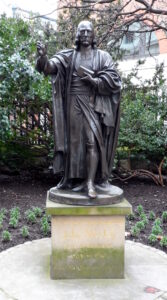


To this day, Anglicanism attempts the apparently impossible. Being sane in a world of crazy charismatics is not currently fashionable. It ought to be. If you visit any of Britain’s Anglican churches with an open mind and heart, you will fall under their spell. Here is piety without god-bothering; compromise without surrender; and simple goodness without sectarian nonsense. The monarch is Head of the Church. And because this is the United Kingdom, He must change His religion north of the Scottish Border. Because He is also King of Scots, and titular Head of the Church of Scotland also. One can readily imagine the late Queen and Her husband on the Royal Train:


And you don’t even have to be English to partake in the sacrament of religious sanity. Anyone can join. If you like Facebook, have a look at the High Church Coyotes. Their daily humour is uneven; but that’s fine. At best it brings joy and laughter to a world desperately in need of it. Here’s two random samples:
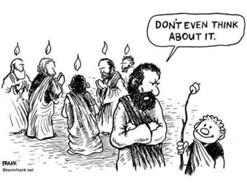

Episcopalians are sane, Anglophile Americans. And what they are saying is this. Being Christian doesn’t mean being a bigoted, Mammon-worshipping lunatic. We can all be better than that. The final word should go to the Reverend William Spooner: a 19thC clergyman with a speech impediment which produced occasional gems like this:
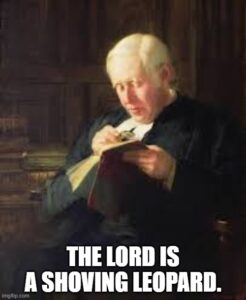

All those of us who love cats can identify with the above piece of idiosyncratic Anglican theology. Actually in medieval bestiaries – another English invention, by the way – the Panther is a Type of Christ, as the Whale was a Type of Satan. Greenpeace would probably disagree, but there it is….